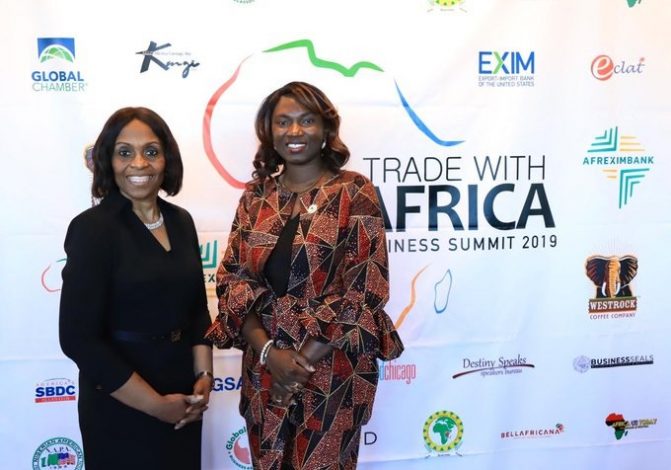The African Export-Import Bank (Afreximbank) has said the impact that trade, finance, and expansion of value chains will have on Africa’s development agenda over the next 20-30 years must be underscored.
Kanayo Awani, Managing Director, Intra-African Trade Initiative, emphasises that improving market integration in Africa should be accompanied by industrialisation and capacity building initiatives.
“To help African countries produce value-added goods and services that can be traded within the continent and globally in a competitive manner,” said Kanayo at the 2nd edition of the Trade with Africa Business Summit held in Chicago on ‘Afreximbank contribution to Africa’s quest for accelerated growth and structural transformation held between 1-2 August.
According to Kanayo, the African continent is ‘marching forward and has made great strides’ with the International Monetary Fund (IMF) projecting a 3.8% growth in 2019.
“Trade is supposed to spur transformation. An international enabling framework must be in place,” she emphasises adding that “We see enormous opportunities…therefore, collaborations, including with governments regional development banks, the private sector, and relevant stakeholders on the continent and in the Diaspora,’ is of huge importance.”
The African Continental Free Trade Area (AfCTA) aims to create the world’s largest free-trade zone. It officially came into force in May and is envisioned to be fully in operation by 2030 with a combined consumer and business spending capacity of $6.7 trillion in 2030.
She said Afreximbank was already financing and facilitating the production of such value-added goods through the implementation of their five-year strategic plan that will see the African continental trade finance institution disburse no less than $90 billion in support of African trade between 2017 and 2021.
The plan, dubbed “IMPACT 2021: Africa Transformed”, defines intra-African trade as trade in goods and services between or among African countries and the flow of goods and services between Africa and Africans in the Diaspora.
This is anchored on four strategic pillars for the Afreximbank, namely: Intra-African Trade; Industrialisation and Export Development; Trade Finance Leadership; and Financial Soundness and Performance. It also defines a set of macro and corporate objectives and targets.
Kanayo says building solid export manufacturing capacities, as well as domestic and continental supply chains, would facilitate increased flow of goods and services across borders in Africa. The Measure ancillary theme introduces monitoring and measurement mechanisms. “It will be transformative in the way Africa trades with itself.”
On the other hand, Albert Muchanga, Africa Union Commissioner for Trade and Industry, in his address to the forum, he said that, ” By creating one African market, we are transforming the landscape to bring in train, a large market of 1.27 billion people (expected to be 1.7 billion in the next eleven years) and large economies of scale and scope which will, in turn, attract largescale and long term investments. Arising from this, the basic incentive for businesses operating in the AfCFTA is that they will face huge and attractive opportunities.”
“Fragmentation in Africa brings with it small economies, small markets, un-competitiveness and a host of other weaknesses which make African economies fail to grow at rates high enough to reduce poverty and overcome the underdevelopment trap that they find themselves in,” he added.
The U.S. and the African Union signed a joint statement on Monday at the 2019 African Growth and Opportunity Act (AGOA) Forum in Abidjan, Ivory Coast reiterating that they share a common goal of enhancing the AU’s efforts to increase continental trade and investment under the AfCFTA.
The African Growth and Opportunity Act, which in 2015 was extended to 2025, provides tariff-free access on 6,500 products to 39 countries, ranging from oil and agricultural goods to textiles, farm and handicrafts.
READ:
- Africa Prosper, Trump’s Africa Policy to Focus on Trade and Security
- Africa, Who Dares Wins
“The United States and the African Union intend to work together with respect to the AfCFTA to promote a sound trade policy environment, regional economies of scale, and the increased flow of goods and services on the continent in order to increase both continental trade and investment, as well as trade and investment between the United States and Africa,” reads part of the joint statement signed by Deputy United States Trade Representative C.J. Mahoney and African Union Commission Commissioner for Trade and Industry Albert Muchanga.




